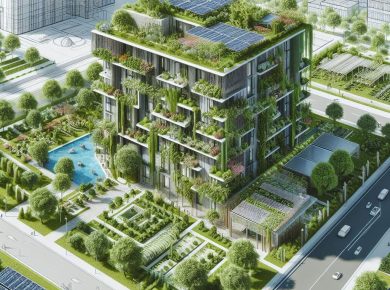As the global population continues to urbanize at an unprecedented rate, the importance of sustainable urban planning becomes increasingly evident. Sustainable cities hold the key to a better future, where economic prosperity, social equity, and environmental sustainability intersect. This essay explores the critical role of urban planning in shaping sustainable cities and fostering a better tomorrow for generations to come.
Understanding Sustainable Urban Planning
Sustainable urban planning aims to create cities that meet the needs of current generations without compromising the ability of future generations to meet their own needs. It involves integrating environmental, social, and economic considerations into urban development strategies to promote long-term sustainability. Sustainable urban planning initiatives focus on reducing carbon emissions, preserving natural resources, promoting equitable access to opportunities, and enhancing quality of life for residents.
Promoting Environmental Sustainability
Environmental sustainability is a core pillar of sustainable urban planning, emphasizing the importance of minimizing environmental impacts and preserving natural resources. Sustainable cities prioritize energy efficiency, renewable energy sources, waste reduction, and green infrastructure. Initiatives such as green building standards, sustainable transportation systems, and urban green spaces contribute to reducing carbon footprints and mitigating the effects of climate change, creating healthier, more resilient urban environments.
Fostering Social Equity
Social equity is another critical aspect of sustainable urban planning, ensuring that all residents have equal access to opportunities and resources. Sustainable cities prioritize affordable housing, accessible healthcare, quality education, and inclusive public spaces. Urban planning initiatives aim to reduce socioeconomic disparities, address systemic inequalities, and promote social cohesion and diversity within communities. By fostering social equity, sustainable cities create environments where everyone can thrive and contribute to collective prosperity.
Driving Economic Prosperity
Sustainable urban planning is also instrumental in driving economic prosperity, promoting innovation, entrepreneurship, and economic resilience. Sustainable cities attract investment, create jobs, and stimulate economic growth through sustainable development practices. Initiatives such as mixed-use zoning, transit-oriented development, and green technology innovation hubs contribute to vibrant, dynamic urban economies that are adaptive to changing market conditions and global challenges.
Building Resilient, Livable Cities
In conclusion, sustainable urban planning is essential for building resilient, livable cities that can thrive in the face of future challenges. By prioritizing environmental sustainability, social equity, and economic prosperity, sustainable cities create environments where people can live, work, and play in harmony with nature. As urbanization continues to accelerate, the importance of sustainable urban planning becomes increasingly critical in shaping the future of cities and fostering a better tomorrow for generations to come.
References
- Beatley, T. (2012). “Green Urbanism: Learning from European Cities.” Island Press.
- Campbell, S. (1996). “Green Cities, Growing Cities, Just Cities? Urban Planning and the Contradictions of Sustainable Development.” Journal of the American Planning Association.
- Cervero, R., & Kockelman, K. (1997). “Travel Demand and the 3Ds: Density, Diversity, and Design.” Transportation Research Part D: Transport and Environment.
- Al-Kodmany, K. (2001). “Using Visualization Techniques for Enhancing Public Participation in Planning and Design: Process, Implementation, and Evaluation.” Landscape and Urban Planning.






